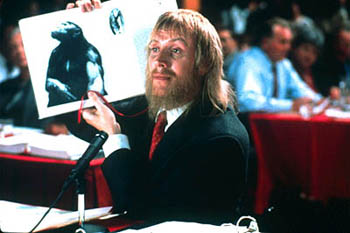![[Metroactive Movies]](/movies/gifs/movies468.gif)
[ Movies Index | Show Times | Silicon Valley | Metroactive Home | Archives ]
Aped Crusader: Rhys Ifans plays a wild child turned activist in 'Human Nature.'
Hail to the Chimp
Smooth civilization takes on hairy wilderness in 'Human Nature'
By Richard von Busack
THE LOSS of director/writer Billy Wilder, who died last week, robbed us of a cynic who knew how to make cynicism appealing. Part of the talent of Wilder--who made such classics as Sunset Boulevard, Double Indemnity, Ace in the Hole and The Apartment--is that sometimes it's not apparent on which side of various genre lines his films land. Is Double Indemnity a comedy or a murder mystery? Is The Apartment a comedy or a tragedy?
Among the newer writers, Charlie Kaufman seems very promising because he is ambiguous as well as literate. Like Wilder, Kaufman cares little for human pretenses. In his films, everyone has a hustle, and the worst people are the ones who conceal them.
Kaufman's two scripts to date--for Spike Jonze's Being John Malkovich and Michel Gondry's Human Nature--defy easy pigeonholing. The morose strain in both keeps them from absolute silliness. Human Nature features Patricia Arquette as a woman whose life is a thorough tragedy--she goes from being a pariah to a prisoner--yet the film is intended to be whimsical, even fluffy.
Like Sunset Boulevard, Human Nature is narrated by a dead man. In a heaven of monochromatic white, the clinical psychologist Nathan Bronfman (Tim Robbins) relates how he was killed. The two living points of the fatal love triangle tell their stories as well. In jail, Lila Jute (Arquette) confesses all; we cut to a hairy, bearded man named Puff (Rhys Ifans) testifying to Congress about his own life.
All is explained in flashback. In adolescence, Lila began growing hair all over her body; she had idiopathic hirsutism, like the dog-faced boy in the circus. She heads for the woods and finds happiness there, which she celebrates in a musical number, "Wind in My Hair." After romanticizing the woods in several books, a need for human love draws her back into civilization--and into painful electrolysis.
She begins dating Nathan, who is chokingly civilized: small-penised, intimidated by his parents. Nathan's research involves trying to electroshock table manners into lab mice. On a hike, Lila and Nathan discover a wild chimp-boy (an enfant sauvage raised by a madman who believed himself to be a pygmy chimp) and bring him back to the lab for some social conditioning. They give him a puppy's name, Puff. Lila finds security in Nathan and excitement in Puff but can't reconcile her contradictory desires.
Here Kaufman is mulling over a quandary seen everywhere from Jean Jacques Rousseau and Tarzan lore to R. Crumb's comic-book story Whiteman Meets Bigfoot: hairy nature vs. smooth civilization. In heaven (or is it hell?), Nathan talks about how he's beyond the sense of all words, as if he were in a preverbal monkey state of grace. And like the hero chimpanzee in Being John Malkovich, Puff is the most uncomplicated character in the movie, a blank slate on which the mad doctor Nathan writes social programming.
But eventually Kaufman reverses himself, making Puff ultimately a treacherous liar. Maybe that's why Ifan, who's like James Spader mistakenly cast in a Brendan Fraser part, shows all the indications of an actor who doesn't know what's expected of him. Similarly, the always-intrepid Arquette, who obviously worked her heart out on this film, shows a perplexity that goes beyond her role.
The one genuine performance comes from Miranda Otto, who plays a gorgeously French-accented lab assistant (and scheming boyfriend-thief) called Gabrielle. Human Nature's essential pedantry can be seen in the way it explains that Gabrielle isn't really French, she's just pretending to be--as if we didn't have ears to hear the amusing fakery, or the imagination to suppose that a girl might prefer to be a French siren to being a plain American mouse. (Human Nature shows how wise it was that Luis Buñuel used to leave so much to the imagination in his own surreal films of ideas.)
For the second time, Kaufman has a music-video veteran directing him, a debuting Michel Gondry. The music video requires arresting images, bursts of quirkiness, images that can be read in a second; the form is low on storytelling, subtlety and ambiguity. Gondry takes seriously the philosophical questions Kaufman raises--did he see them mulled over in Alain Resnais' Mon Oncle d'Amerique, with its human mice in their mazes?
Kaufman's ideas, plentiful as they are, are the most tangled part of Human Nature. This film's flatness is invincible; the dialogue resounds as if it were echoing off a proscenium arch. Unfortunately, Kaufman, a mocker, dithers over the contrast between the wild and the tame. Eventually, he ends coming out for both at the same time, in a deeply unsatisfying ending.
[ Silicon Valley | Metroactive Home | Archives ]
Copyright © Metro Publishing Inc. Metroactive is affiliated with the Boulevards Network.
For more information about the San Jose/Silicon Valley area, visit sanjose.com.
![]()

Photograph by Bruce Birmelin
Human Nature (R; 96 min.), directed by Michel Gondry, written by Charlie Kaufman, photographed by Tim Maurice Jones and starring Tim Robbins, Patricia Arquette and Rhys Ifans, opens Friday at the Camera 3 in San Jose.
Send a letter to the editor about this story
.
From the April 11-17, 2002 issue of Metro, Silicon Valley's Weekly Newspaper.